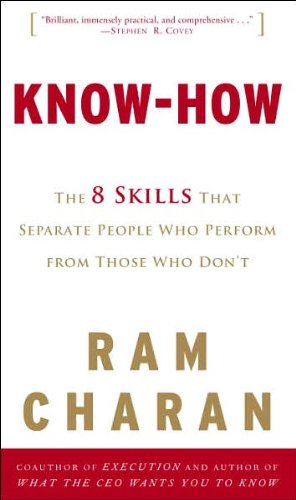- Features
- Description
- Similar Items
Binding:
HardcoverBrand:
EAN:
9780307341518Label:
Crown BusinessManufacturer:
Crown BusinessModel:
Size:
Warranty:
In Know-How, Ram Charan, coauthor of the bestseller Execution: The Discipline of Getting Things Done, gives readers a bold new approach to understanding leadership. Charan suggests that when it comes to choosing our business leaders, we don't recognize the crucial difference between the appearance of leadership and the actual ability to run a business. We focus too much on superficial things, like raw intelligence or a commanding presence, and don't pay near enough attention to the skills leaders need. In his new book, Charan identifies the eight skills leaders must develop and refine, and explains how personal traits factor in. Curious readers can learn more about Know-How: The 8 Skills That Separate People Who Perform from Those Who Don't in our brief Q & A with author Ram Charan, and sneak a peek at the first chapter, below. --Daphne Durham
Q&A with Ram Charan
Q: You identify 8 know-hows. Can you take us through one of them?
A: In this time of continual change, money making or business models are becoming obsolete more frequently than ever before. It wasn't that long ago when AOL was king of the hill. That leadership was taken over by Yahoo. Now Yahoo is at a crossroads and the leadership has been taken over by Google. So far Google is ahead. It has the central recipe to increase its revenues via advertising because it knows how to measure advertising effectiveness better than anybody else. Leaders at both AOL and Yahoo must be scratching their heads trying to figure out how to reposition the company to make money in the new context. Repositioning is a know-how. It's hard work, and it requires imagination. We will have an opportunity to see about the decision made by Time Warner top brass to summarily replace Jim Miller with Randy Falco of NBC Universal. Randy has a distinguished record. He will have to demonstrate one of the most crucial know-hows in this book: Can he reposition AOL for the new game, and in time? Cost cutting is not the answer.
Q: How can you build your know-how, or help others develop theirs?
A: No talented athlete ever became a champion without consistent regular practice in the right way, along with feedback and hard work. There are no short cuts.That's why you should start practicing early in your career by taking assignments that will help you cultivate the know-hows and seeking out bosses you can learn from.
Q: Many people think of leaders as having innate traits that set them apart from the rest of us. Are you saying we should be looking at skills instead of personality?
A: At the time somebody enters the work force, a great deal of his or her personality has been formed. Most people who talk about leadership today talk about personality, personality, personality. Personality traits, presence, charisma--they will experience attrition if you don't practice them in the context of know-hows. Personality traits and know-hows reinforce each other. In the 21st century, the transparency of results is immediate. Failure is detected very early. Dependence on personality traits without the mastery of the know-hows is a recipe for disaster.
Q: What do you think about the future?
A: The future is very bright. The global economy will continue to expand. There will be more demand for leaders than ever before. Master the know-hows. Hone your personality traits while you're mastering the know-hows. Don't forget that your success must come in the context of global competition. Take the opportunity to win.
Read the First Chapter of Know-How
The Substance of Successful Leaders
Know-how is what separates leaders who perform--who deliver results--from those who don't. It is the hallmark of people who know what they are doing, those who build longterm intrinsic value and hit short-term targets. What gets in the way of finding people who can perform is the appearance of leadership. All too often I see people being chosen for leadership jobs on the basis of superficial personal traits and characteristics, such as:
• The seduction of raw intelligence: "He's extremely bright, incisive, and very analytical. I just feel in my gut he can do the job."
• A commanding presence and great communication skills: "That presentation was awesome. How she ever boiled down all that data onto the PowerPoints is beyond me. She certainly had the committee in the palm of her hand. Mark my words, she's going to the top."
• The power of a bold vision: "What a picture he painted of where we are going, moving forward."
• The notion of a born leader: "The people in the unit love her. Such a morale builder and motivator!"
Certainly intelligence, self-confidence, presence, the ability to communicate, and having a vision are important. But being highly intelligent doesn't mean that a person has the knack for making good business judgments. How many times have you seen people confidently making decisions that turn out to be disastrous? How often have you heard a vision that turned out to be nothing more than rhetoric and hot air? Read more from Chapter 1...






